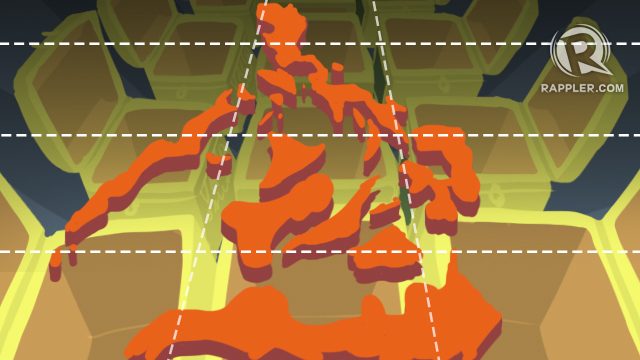SUMMARY
This is AI generated summarization, which may have errors. For context, always refer to the full article.

MANILA, Philippines – Political dynasties will still flourish under federalism, which may even escalate tensions and violence among clans in the regions, according to a recent Philippine Center for Investigative Journalism (PCIJ) report.
The Consultative Committee on the 1987 Constitution decided to regulate and not to ban dynasties in the proposed new charter.
The anti-dynasty provision bans relatives from succeeding an incumbent official who is their relative. It also allows only up to two relatives to run for a national post and a local or regional post in the same election cycle, provided no relative of theirs is holding an elective post.
PCIJ, however, pointed out there is a long road ahead for this proposal: It has to reviewed by Congress sitting as a Constituent Assembly (Con-Ass), and has to undergo a plebiscite.
“And if by some miracle the ban on political dynasties passes approval, all that it would prohibit is the succession and simultaneous holding of public office by members of the same family, up to the second degree of affinity or consanguinity (parents, children, siblings),” PCIJ said.
PCIJ also pointed out that the draft new charter “calls for the conduct of synchronized elections for all regional and federal positions in May 2022 – on a zero-sum game basis.”
“This means simply that old and new politicians, notably those from the about 200 political clans enduring, emerging, and lording over the nation’s 81 provinces could all run for a 4-year term, and even get reelected for another 4,” PCIJ said.
“And because all the same clan members could all run — and win as they most likely would — they could grab 10 more years of uninterrupted reign in their turfs during the 10-year transition period to federalism,” it added.
Same names, same faces
PCIJ analyzed data of the Commission on Elections (Comelec) in 6 of the 20 vote-rich provinces from the 1992 elections. These 6 provinces have a total voter count of 10.86 million, or 20% of the latest total of registered voters of 55.5 million
The Comelec data, according to PCIJ, showed at least 101 different family names that are each tied to at least 8 electoral successes in the last 8 elections, excluding the barangay seats. These family names are shared and carried by as many as 1,159 elected officials.
Under federalism, provinces will be clustered into regions, which will then have a single government. This means political families will fight for power for control of the region. (READ: 4 things you need to know about PH’s draft constitution)
While federalism is eyed to be the mechanism for sharing public funds among rich and poor regions, it could also have its “unintended consequences.”
De La Salle University (DLSU) political science professor Julio Teehankee, also a ConCom member, told PCIJ that these include “escalated political rivalry and electoral violence among political clans.”
DLSU professor Ronald Holmes, head of Pulse Asia, also expressed concern that federalism could just “create new patrons” and even “semi-patrons at the subnational level.”
“[This is because] the clans battle it out over not just the presidency, but also the federal states’ premier posts,” PCIJ said.
Regions, clans
Here are some of the proposed federal regions and the families that dominate the provinces now:
- National Capital Region (NCR)
The Belmontes of Quezon City comprise the biggest political family in NCR. The PCIJ said that in the other cities of NCR, the same political families have also held power over the last 15 years.
These include the Binays of Makati; the Zamoras and Estrada-Ejercitos of San Juan and Manila; the Cayetanos of Taguig; the Aguilar-Villar clans of Las Pinas; the Eusebios of Pasig; the Gatchalians of Valenzuela; the Abaloses of Mandaluyong; the Echiverris of Caloocan; and the Oretas of Malabon.
- Ilocos Region
According to PCIJ, the current political families of Ilocos Region include the Singsons of Ilocos Sur, the Ortegas of La Union, and the Espinos of Pangasinan. The Marcos family also maintains “a firm grasp on the gubernatorial seat and House representation” for Ilocos Norte.
- Cagayan Valley
The Dys of Isabela, and the Vargases and Mambas of Cagayan, are the reigning political families in the region.
- Central Luzon
The Alvarados of Bulacan, the Umalis of Nueva Ecija, and the Yaps and Cojuangcos of Tarlac are the prominent families in the region.
- Calabarzon
The Ynares family of Rizal is “one of the longest-reigning and largest political clans” in the region, said PCIJ. The region also has the Revillas of Cavite, the Suarezes of Quezon province, as well as the Chipecos, San Luises, Ramoses, Sanchezes, Ejercitos, and Buesers of Laguna.
- Mimaropa
Alvarez family of Palawan and Umali family of Oriental Mindoro
For the full PCIJ report, click here. – Rappler.com
Add a comment
How does this make you feel?





There are no comments yet. Add your comment to start the conversation.